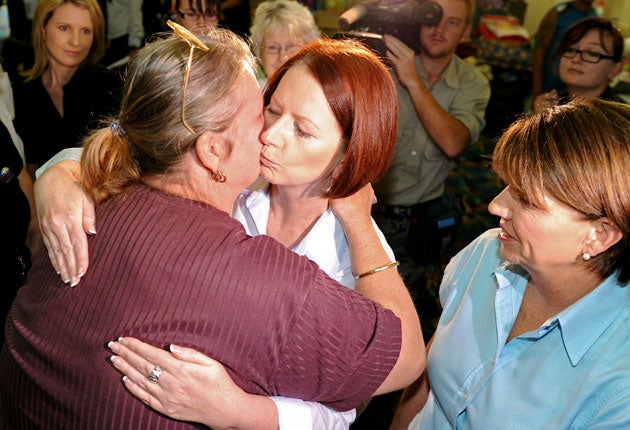Food drops and handouts for Australian flood victims

Your support helps us to tell the story
From reproductive rights to climate change to Big Tech, The Independent is on the ground when the story is developing. Whether it's investigating the financials of Elon Musk's pro-Trump PAC or producing our latest documentary, 'The A Word', which shines a light on the American women fighting for reproductive rights, we know how important it is to parse out the facts from the messaging.
At such a critical moment in US history, we need reporters on the ground. Your donation allows us to keep sending journalists to speak to both sides of the story.
The Independent is trusted by Americans across the entire political spectrum. And unlike many other quality news outlets, we choose not to lock Americans out of our reporting and analysis with paywalls. We believe quality journalism should be available to everyone, paid for by those who can afford it.
Your support makes all the difference.Military aircraft dropped supplies to towns cut off by floods in northeastern Australia as the prime minister promised new assistance yesterday to the 200,000 people affected by waters covering an area larger than France and Germany combined.
Residents were stocking up on food or evacuating their homes as rising rivers inundated or isolated 22 towns in the state of Queensland.
Prime Minister Julia Gillard toured an evacuation centre in the flood-stricken town of Bundaberg, announcing that families whose homes had been flooded or damaged would be eligible for disaster relief payments of A$1,000 (£653) per adult and A$400 per child.
"My concern is for the people in these very difficult times," Ms Gillard said. On Thursday she pledged A$1m in federal aid to match a relief fund already set up by the state government.
Bundaberg resident Sandy Kiddle told Ms Gillard she had lost cherished items when floodwaters surged through her house. She may not be able to return to her home for a week. "It was just a sea of water, and I thought the beach would never come to our house," she told Ms Gillard, who gave her a hug.
Officials say half of Queensland's 715,305 square miles – an area bigger than the state of Texas – is affected by the relentless flooding, which began last week after days of pounding rain caused swollen rivers to overflow.
While the rain has stopped, the rivers are still surging to new heights and flowing into low-lying towns as the water makes its way towards the sea.
The muddy water inundating thousands of homes and businesses has led to a shortage of drinking water and raised fears of mosquito-borne disease.
"This is without a doubt a tragedy on an unprecedented scale," Queensland Premier Anna Bligh told Australian Broadcasting Corp.
Join our commenting forum
Join thought-provoking conversations, follow other Independent readers and see their replies
Comments